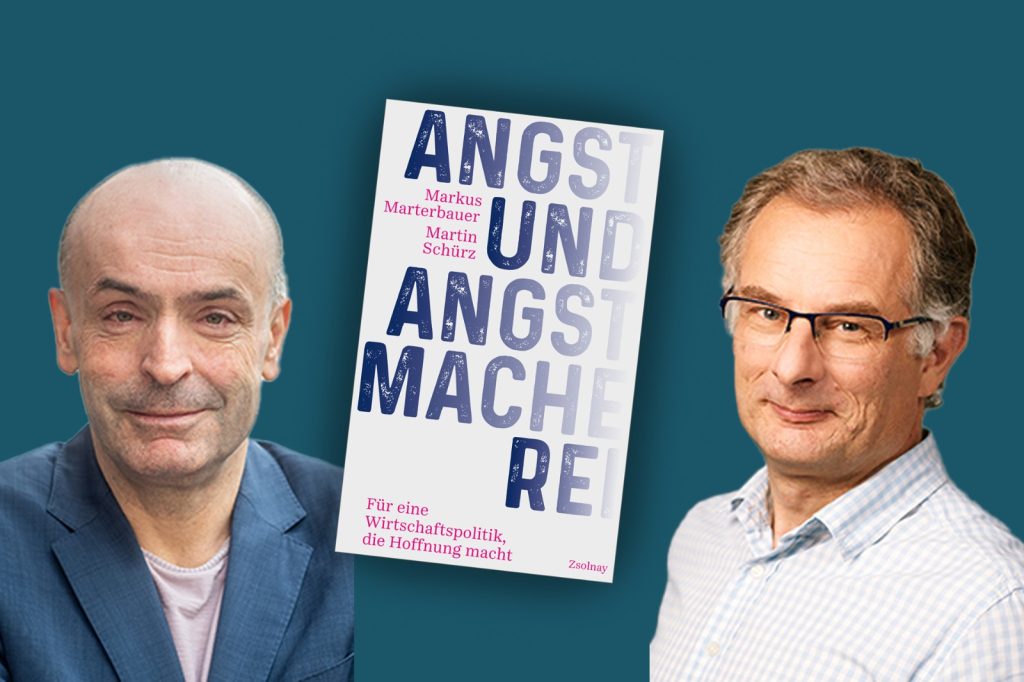A world in which there is neither poverty nor wealth – is this possible? Yes, say the economists Marcus Marterbauer and Martin Schurr. In their new book, Fear and Fear Promoting, they explain why we should want such a world and how we can implement it.
Our society is full of fear, especially the socially disadvantaged who are tormented by fears. And this fear as a basic mood has a benefit – it benefits rulers. “Domination thrives on fear and thrives on it,” is a preliminary thesis In the new book “Fear and the promotion of fear. For an economic policy that gives hope” Written by Marcus Marterbauer and Martin Schurr. Marterbauer is the chief economist at the Vienna Chamber of Labor, and Schurz is a wealth researcher and psychotherapist—the two have been friends since their school days. In their first book together, the two famous economists focus on people’s fears of existential hardship, unemployment, or loneliness. Because they do not just want to allow the “technocratic view of the economists” to express their opinions.
Lowering minimum income, keeping unemployment benefits low: it’s about scaring people
People only have to put up with the fear of material hardship, humiliation, and devaluation in an unjust society. The authors found that they “should not be in a just society”. When governments refuse to protect people from poverty, they make a conscious choice to allow people to live in fear. Minimum income is lowered, unemployment benefits and emergency aid are left at a low level, and job seekers are under pressure. The strong are signaling to the unemployed and precarious employees that they are not protected and have to give up a cheaper cost.
“Neoliberal economic policy tries to intimidate people into certain situations,” the economists put it.
The two economists believe that these inconveniences are not about big money. If you are going to raise unemployment benefits, emergency assistance, and social assistance above the poverty line, increase your compensatory allowance and heating allowance.It will only cost 2 to 3 billion euros. This is only one time Two percent of total social spending.
Crush the economic, political and cultural power of the rich
In the search for ways to reduce fear, the book quickly ends up in The Wealth of the Rich – because this is where you should start:
Exorbitant Wealth shows that overcoming major crises, from climate change to social inequality, must not fail because of finance. There is enough money.”
For the economic policy of hope that enables everyone to live without fear, “it is necessary today to break the economic, political and cultural power of the excessively wealthy” to protect the wealth of the rich. Their exorbitant wealth and the influence of their money in the economy, but also in politics, must be put to an end. That is, a limit to wealth and the exercise of power that goes along with that wealth.
Circumstances like the nineteenth century again without giving up
Because the danger of democracy begins in the realm of wealth, they warned Marterbauer and Schurz. The problem of getting rich is not the yachts and luxury mansions of the wealthy, but the concentration of power in a small minority. It is refreshing that the analysis of the crisis of democracy is not limited to the disadvantaged or “losers” – who no longer participate in the political process or just protest – but looks at the top of the social hierarchy.
The problem of getting rich is not the yachts and luxury mansions of the wealthy, but the concentration of power in a small minority.
who – which The wealth of the richest 1 percent of the population It has risen sharply since the 1980s, It now owns 50 percent of the assets in Austria. Assets now exceed total earned income by a factor of five to six. The share of inheritance in economic output is now 15 percent and is fast approaching the importance of inheritance in the nineteenth century.
Progressive wealth tax and inheritance tax – no exceptions
Surveys show that the majority of Austrians – including the richest – would give the richest 1% a 12% share of the total wealth, which would be a significant reduction in their real wealth. So both Marterbauer and Schurz suggest one Progressive wealth tax on total net wealth (financial and physical assets) of one million euros (this affects 4 percent of the population) and one progressive inheritance tax Before.
The he won It should be tax free Dedicated Be: to expand kindergartens, schools and welfare with an inheritance tax – and to fight poverty with a property tax. In general, the wealth tax must at least exceed the average income tax rate of 15%. Those who earn at least a living from their work must not pay higher taxes than those who can live off their assets without working..
When there are billionaires, there should be no poverty
Wealth taxes are about financing an improved welfare state for all. It is the services provided by the welfare state and public infrastructure that reduce people’s fears. Wealth must be associated with poverty:
“In a society with billionaires, there should be no poverty,” is the book’s simple and justified demand.
When the welfare state and public services are expanded from wealth tax money, the security in the society also increases. Then you do not need wealth to be able to live well and freely.
“The welfare state is the wealth of the poor and the middle,” Marterbauer and Schurz wrote.
Book presentation with Marcus Marterbauer and Martin Schurr |
|
the book Fear and intimidation – for an economic policy that gives hope It will be released on September 26th. It will be presented for the first time on September 27, 2022 at 6 pm at CAPE 10 (Alfred-Adler-Straße 1, 1100 Vienna). The authors will be musically accompanied by Mieze Medusa, and the event will be moderated by Patricia Huber, Editor-in-Chief of Kontrast. You can register via the Rainer Institute, which is organizing the event: https://renner-institut.at/veranstaltungen/angst-und-angstmacherei-fur-eine-wirtschaftspolitik-die-hoffnung-macht |
What helps against control? The ceiling of assets is billions of euros
But there is a third proposal aimed exclusively at the power of the wealthy: Marterbauer and Schurz propose an asset limit of €1 billion – no one should own more assets. This procedure is primarily aimed at democracy promotion to serve. Writers just want the tangible limit taken as a suggestion Know, which can also be placed at a lower or higher level in a social discussion. The goal is to put an end to wealth and enrichment.
“The idea of maximum wealth is to limit the power of the super-rich and to defend democracy,” the authors say.
In any case, without social and political support, they would not have such enormous wealth at their disposal. There is no “natural distribution of wealth which is subsequently altered by the state,” but the accumulation of wealth has always been underpinned by property rights, public infrastructure, but also beneficial tax laws, economic development and aid funds. There are “massive wealth-enhancing government services” that are not described as social benefits. Business support has tripled during the pandemic – and thus much more than social spending.
“It’s amazing how little embarrassment the wealthy can be when they stand in line to save the state at the first opportunity, but at the same time they defend themselves aggressively against property taxes,” said Marterbauer and Schurz.
The large reduction in the stock of wealth allows for effective alleviation of poverty and relief of anxiety. The welfare state can be strengthened and the possibility of providing high-quality care to all – without exploiting employees.
AMS will no longer force the unemployed into bad jobs; On the contrary, it no longer provides full-time jobs for less than €1,700. The public health and education system will be strengthened, and social housing will grow. Emotionally, these securities will help reduce status fears and ease fears of failure because one can rely on the welfare state.
With this book, the authors stood by the “socially disadvantaged, people tormented by fears.” Anyone who shares his goal of a future free of fear and hope should read this very interesting and fact-packed book.

“Explorer. Communicator. Music geek. Web buff. Social media nerd. Food fanatic.”





More Stories
What Matty Healy's mother says about Taylor Swift's TTPD
NASA astronauts Butch Wilmore and Sonny Williams arrive in Florida on Boeing's first manned space flight.
Heartstopper Season 3 adds Jonathan Bailey and Hayley Atwell